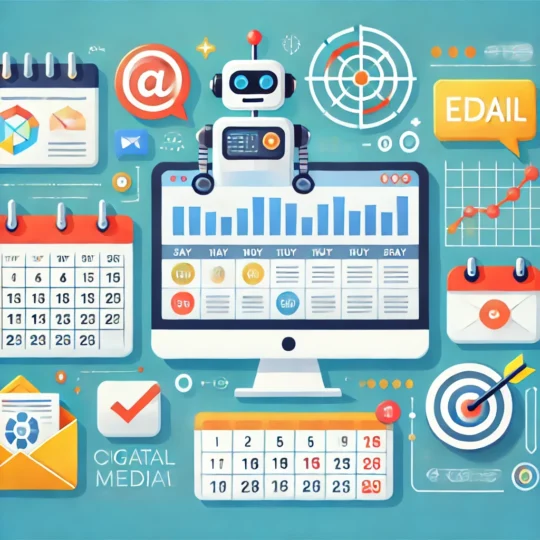
What Are the Benefits of Using Automation in Digital Marketing?
Introduction
Digital marketing automation is revolutionizing the way businesses interact with customers and manage their marketing efforts. By leveraging automated tools and software, companies can streamline repetitive tasks, improve customer experiences, and enhance overall marketing efficiency. In this blog post, we will explore the key benefits of using automation in digital marketing and address some frequently asked questions to help you understand how it can transform your marketing strategy.
Benefits of Using Automation in Digital Marketing

aiclex.in
- Increased Efficiency and Productivity Automation significantly boosts efficiency by handling repetitive tasks that would otherwise consume valuable time. Tasks such as email marketing, social media posting, and campaign management can be automated, allowing your team to focus on more strategic activities. For example, scheduling social media posts in advance through tools like Hootsuite or Buffer can save hours each week, ensuring a consistent online presence without manual effort.
- Improved Customer Experience Automation enables businesses to deliver personalized and timely responses to customer interactions. Automated email responses, chatbots, and personalized marketing messages ensure that customers receive the information they need when they need it. For instance, a well-designed chatbot can answer common customer queries instantly, providing a seamless and satisfying user experience.
- Enhanced Data Management and Analysis Automation tools collect and analyze vast amounts of data more efficiently than manual methods. By using analytics platforms, businesses can gain insights into customer behavior, campaign performance, and market trends. Tools like Google Analytics and HubSpot provide detailed reports that help marketers make data-driven decisions and optimize their strategies for better results.
- Cost-Effectiveness By automating routine tasks, businesses can reduce labor costs and maximize their return on investment (ROI). Automation allows companies to do more with less, reallocating resources to more impactful areas. For example, an automated email marketing campaign can reach thousands of customers with minimal human intervention, generating leads and sales at a fraction of the cost of traditional methods.
- Better Targeting and Personalization Automation enables precise targeting and personalization by leveraging customer data. Marketers can create segmented campaigns that deliver relevant content to specific audiences. For example, an e-commerce site can use automation to send personalized product recommendations based on a customer’s browsing history and past purchases, increasing the likelihood of conversion.
- Scalability Automation allows businesses to scale their marketing efforts without proportional increases in cost or labor. Whether you’re managing a small business or a large enterprise, automation tools can handle increasing volumes of tasks and data efficiently. This scalability is particularly beneficial during peak times, such as holiday seasons, when marketing activities intensify.
- Consistent Marketing Efforts Maintaining consistency across all marketing channels is crucial for brand recognition and trust. Automation ensures that your marketing messages are consistent and timely across platforms. Tools like social media schedulers and email marketing software allow you to plan and execute campaigns seamlessly, ensuring a cohesive brand voice.
- Improved Lead Management Automation streamlines lead management processes, from capturing and nurturing leads to scoring and follow-ups. Automated lead nurturing campaigns can send personalized emails to leads based on their interactions with your website, guiding them through the sales funnel. Lead scoring tools help prioritize leads based on their engagement levels, ensuring your sales team focuses on the most promising prospects.
- Increased Conversion Rates Automation improves conversion rates by optimizing various aspects of your marketing campaigns. Automated A/B testing, for example, allows you to test different versions of a campaign element to determine which performs better. This data-driven approach helps refine your strategies and increase the likelihood of conversions.
- Enhanced Reporting and Insights Automated reporting tools provide real-time insights into your marketing performance. These tools generate comprehensive reports that highlight key metrics, such as click-through rates, conversion rates, and ROI. With instant access to this data, marketers can quickly identify what’s working and make informed decisions to improve their campaigns.
10 Frequently Asked Questions (FAQs)
- What is digital marketing automation? Digital marketing automation involves using software and tools to automate repetitive marketing tasks such as email campaigns, social media posting, and data analysis.
- How does automation improve efficiency in digital marketing? Automation handles routine tasks, freeing up time for marketers to focus on strategy and creative work, thus improving overall efficiency.
- Can automation help personalize customer interactions? Yes, automation enables personalized marketing by using customer data to deliver targeted content and responses based on individual behaviors and preferences.
- Is marketing automation cost-effective? Yes, automation reduces labor costs and increases ROI by optimizing marketing processes and improving targeting.
- How does automation enhance data analysis? Automation tools collect and analyze data more efficiently, providing actionable insights through detailed reports and dashboards.
- What types of tasks can be automated in digital marketing? Common tasks include email marketing, social media management, lead nurturing, data analysis, and reporting.
- Can small businesses benefit from marketing automation? Absolutely. Automation is scalable and can help small businesses manage their marketing efforts more effectively and efficiently.
- How does automation improve lead management? Automation streamlines lead nurturing, scoring, and follow-up processes, ensuring that leads are effectively guided through the sales funnel.
- What tools are commonly used for marketing automation? Popular tools include HubSpot, Marketo, Pardot, Hootsuite, and Google Analytics, among others.
- Is it difficult to implement marketing automation? While there is a learning curve, many automation tools are user-friendly and offer comprehensive support to help businesses get started.
Conclusion
Automation in digital marketing offers numerous benefits, from increased efficiency and improved customer experiences to enhanced data management and cost savings. By implementing automation tools, businesses can streamline their marketing efforts, achieve better results, and stay competitive in the ever-evolving digital landscape. Start exploring automation options today and unlock the potential to transform your marketing strategy.


